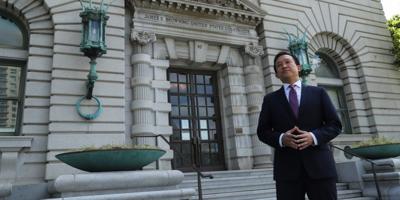
San Francisco City Attorney David Chiu
A state appeals panel has restored part of a lawsuit accusing San Francisco of assessing illegal stormwater sewer fees.
The allegations against the city and county government arise under Proposition 218, which earned statewide referendum approval in 1996. Specifically, the lawsuit takes aim at provisions regulating how cities and counties can ask local voters to impose certain property-based charges and a requirement that such charges “shall not exceed the proportional cost of the service attributable to the parcel.”
In their complaint, Robert Gluck and Adam Hertz note that fees for "sewer" services are generally exempt from Prop 218 standards. But in their action, the plaintiffs said the city’s stormwater fees weren’t the same as charges for “sewer” services.
They also alleged the government recovered stormwater costs using a sewer rate formula set to charge for wastewater collection, violating the proportionality rule, and asked for a court order to stop the practice.
San Francisco Superior Court Judge Rochelle East granted the government’s motion to dismiss the complaint without allowing the plaintiffs to amend their lawsuit.
They challenged that ruling before the California First District Appellate Court. Justice Carin Fujisaki wrote the opinion, filed May 30; Justices Alison Tucher and Victor Rodríguez concurred.
The panel revived only the final two aspects of the complaint: allegations relating to proportionality and the request for judicial edict.
“San Francisco is the only coastal city in California with a combined sewer system, which began over a century ago,” Fujisaki wrote. “To support development from the California Gold Rush in the 1850s, the system was designed to carry wastewater and stormwater flows to the shoreline. By 1899, over 300 miles of combined sewer lines had been completed. The city’s master plan in 1935 led to the construction of the first treatment plants as well as additional sewer lines, creating a total collection system of approximately 900 miles.”
The panel detailed how the San Francisco Public Utilities Commission studied the cost of its services in 2018 and why sanitary and storm sewer costs weren’t isolated on rate tables. A new study in 2023 yielded a mechanism for splitting the charges and establishing a tiered residential storm sewer fee structure based on lot size and permeable area calculations with a standard rate for nonresidential customers based only on the actual square footage of impermeable and permeable area.
For fiscal year 2024, the plan would generate more than $301 million for wastewater service and almost $88 million for storm sewer costs. The 2023 report suggested gradual application of the changes for consumer affordability and predictability.
Gluck and Hertz sued in October 2023. In both their arguments in superior court and on appeal, the men said a definition of “sewer” in an old state senate bill can’t survive because the enacting legislation is unconstitutional. But the panel said “the as applied nature” of that challenge, along with the government’s response, means the actual question is “whether City’s combined sewer system provides ‘sewer’ services" stood outside Prop 218’s voter approval requirement.
Fuijsaki noted Prop 218 doesn’t define “sewer” or the other excepted fee categories — water and garbage collection — which means the relevant context is other accepted statutes at the time voters approved the referendum. That includes a 1970 Public Utilities Code bolstering the city’s position, and although other statutes “appear to address wastewater (sewerage) and stormwater systems as separate systems … viewed in context, such statutes do not suggest that a combined system is not a sewer system.”
The panel further turned to dictionary definitions and other appellate decisions interpreting Prop 218, including distinctions for governments that don’t operate combined sewers where stormwater drainage fees were not found exempt. Finally, the panel said, it wasn’t persuaded referendum voters intended the inclusion of “sewer” in Proposition 218 to apply to only part of combined systems.
However, the panel agreed with the plaintiffs that their arguments on proportionality were strong enough to advance to the pleading stage. Whereas the government insisted it wasn’t obligated to apportion the costs since the entire system was “sewer,” the complaint alleged “the costs attributable to wastewater factors and to stormwater factors differ in criteria and calculation,” which adequately addressed that portion of Prop 218.
Further, Fujisaki wrote, there is a possibility a judge finds the plaintiffs correct on legal grounds because the government has yet to show support for its position that waste and storm sewers “can be used interchangeably to satisfy the proportionality requirement.” The factual question of the legality of the government’s fee structure wasn’t appropriate for resolution through dismissal, the panel said.
“At the very least, SFPUC’s 2018 and 2023 reports suggest it had historically recovered sewer charges based on wastewater cost factors because of difficult challenges in identifying and/or isolating stormwater costs, not because of any conclusive authority that such practices satisfied Proposition 218’s proportionality requirement,” Fujisaki wrote. “Now having the ability to do so, SFPUC has proposed that separate stormwater charges will ‘enhance the equity in its rate structure.’ Indeed, SFPUC anticipated that separate stormwater charges would have ‘significant bill impacts’ for certain customers, and thus decided that implementation of the new rate structure ‘should take place over a few years instead of all at once.’ ”
Because the dismissal of the request for a court order was based on the other claims, the panel also said that matter should be restored on remand to superior court to the extent it relates to proportionality. The parties will bear their own costs on appeal.
Gluck and Hertz were represented by the Law Office of Amy Sparrow and Cohelan Khoury & Singer.
City Attorney David Chiu represented the government with Deputy City Attorneys Alexander Holtzman and Sara Eisenberg.




